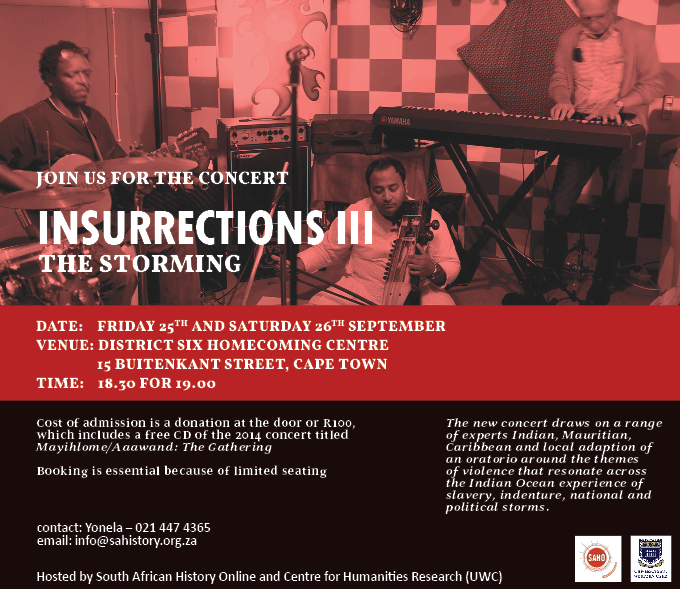Insurrections Ensemble returns with The Storming

Prepare for some Stormy Weather - the Insurrections Ensemble is returning for two performances on the 25th and 26th of September at the Homecoming Centre of District Six. UCT’s Centre for African Studies is co-hosting this loose adaptation of Aimé Césaire’s the Tempest, once more involving, lyricists, performers and composers from South Africa and India.
This, the brainchild of Ari Sitas and Smangala Damodaran has had two incarnations this far. Yet this, the third one threatens to be the most ambitious. Titled, The Storming, it brings back Damodaran’s voice and the masters of sarangi and sarod, Ahsan Ali and Pritam Ghoshal and African multi-instrumentalists like Sazi Dlamini, vocalists like Tina Schouw, jazz masters like Brydon Bolton and Paki Peleole. To this brew are added the wonder-guitarist Reza Khota, the African soundscraper Ncebakazi Mnukwana and UCT’s Carnatic expert Michael Nixon on the weena.

The starting point of Césaire’s piece was significant in two ways: the ensemble wanted for some time to move from song-cycles to a narrative drama structure without moving towards the operatic. The lyricists of the ensemble too, Vivak Narayanan, Sabitha TP, Mbali Vilakazi, Malika Ndlovu and Ari Sitas were also feeling that the heightened temperature here of a rising anti-colonialism and a magnified racism in everyday life, needed a grounding of sorts. That the Césaire text was a response to Shakespeare’s troubled classic made the challenge real. That it addressed issues of slavery and indenture was helpful indeed. After a few readings though and readings too of other Caribbean, Mauritian and Indian adaptations, the original idea became a loose reference.
The Ensemble is using this phase of compositional work to get ready for its 2016 travels to the East Coast of Africa, to Zanzibar and then to India.
The event is curated by the SA History Online in association with the Centre for Humanities Research at the University of the Western Cape and the Centre for African Studies at the University of Cape Town.